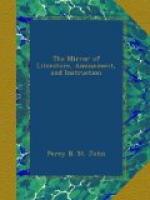Feb. 3. Mr. Hunt.—I was particularly curious to witness the debut of the Hon. Member for Preston, in an assembly so little accustomed, as that so long misnamed the House of Commons, to such an out-and-outer of the Demos coming between the wind and their nobility—to see whether any gaucherie of manner would betray an uneasy consciousness of his not being quite at ease among those scions of aristocracy, who occupy benches originally intended for the virtual representatives of the people. Mr. Hunt, on the whole, bore himself well; and, by a total absence of affectation, of either tone or manner—that surest test of the gentleman, at least of Nature’s forming—disappointed his audience of their ready smiles at demagogue vulgarity. But once, and that for a moment, did his self-possession seem to fail him while going through the ceremonies preceding a new member’s taking his seat. After the member has signed his name and taken the oaths, he is formally introduced by the Clerk of the House to the Speaker, who usually greets the new trespasser on his patience by a shake of the hands. This ceremony is in general performed by the present Speaker with a gloved hand towards those not particularly distinguished by wealth or pedigree. When the new member for Preston was introduced to him, he was in the act of taking snuff, with his glove off. Mr. Hunt made a bow, not remarkable for its graceful repose, at a distance—apprehensive, as it struck me, that the acknowledgment would be that of a noli me tangere, exclusive. He was agreeably disappointed: the Speaker gave him his ungloved hand at once, in a manner almost cordial; and Mr. Hunt took his seat, evidently pleased by the flattering courteousness of his reception.
I take it that the personal appearance of Mr. Hunt is too well known to require description. He is, take him altogether, perhaps the finest looking man in the House of Commons—tall, muscular, with a healthful, sun-tinged, florid complexion, and a manly Hawthorn deportment—half yeoman, half gentleman sportsman. To a close observer of the human face divine, however, his features are wanting in energy of will and fixedness of purpose. The brow is weak, and the eyes flittering and restless; and the mouth is usually garnished with a cold simper, not very compatible with that heart-born enthusiasm which precludes all doubt of truth and sincerity.
* * * * *
TRUTH.
Friend, Truth is best of all. It
is the bed
Where Virtue e’er must
spring, till blast of doom;
Where every bright and budding thought
is bred,
Where Hope doth gain its strength,
and Love its bloom.
As white as Chastity is single Truth,
Like Wisdom calm, like Honour
without end;
And Love doth lean on it, in age and youth,
And Courage is twice arm’d
with Truth its friend.
Oh! who would face the blame of just men’s
eyes,
And bear the fame of falsehood
all his days,
And wear out scorned life with useless
lies,
Which still the shifting,
quivering look betrays?




